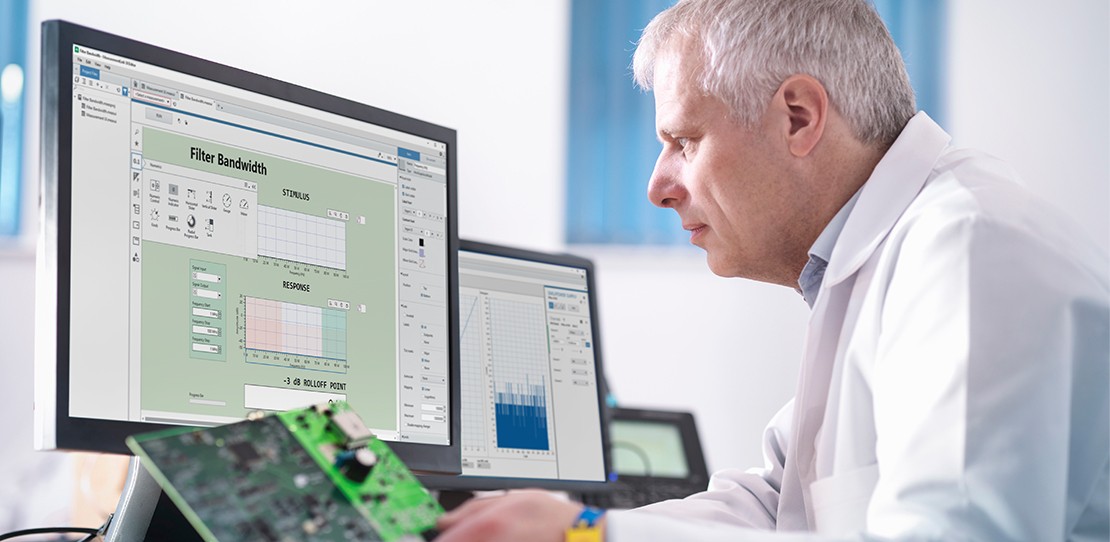
Accelerating Time to Market: NXP’s Validation Transformation
CUSTOMER STORY
SEMICONDUCTOR | 7 MINUTE READ
NXP leverages advanced automation and standardization in semiconductor validation, boosting efficiency and reducing time to market with NI’s robust tools.
Our world runs on electronics, from our phones to the cars we drive, and the semiconductor industry is the core of this digital age. Essential as it is, the semiconductor industry finds itself in a frustrating paradox with both shortage and oversupply challenges at once. Deloitte’s comprehensive study, the 2023 Semiconductor Industry Outlook, explains that digital transformation is needed to combat macroeconomic factors and challenges in the industry.
In the face of increasing product complexity and the multifaceted challenges that the industry encounters, conventional test approaches are no longer sufficient. Automation, an integral facet of digital transformation, stands out as a pivotal solution. Though beginning to automate processes may seem like a small step in the journey to digital transformation, it can have a huge impact on an organization’s efficiency and shorten time to market. This change is crucial as the sector faces global challenges and increasingly complex product development.
Global semiconductor company NXP drives innovation despite the state of the industry. Their journey, pivoting from conventional methods to leveraging advanced automated systems, showcases the monumental potential of integrating technology to refine output and streamline product validation. Wolfgang Rominger, Validation Engineer and Architect at NXP Austria, shares how the organization has embraced automation to ensure their products undergo rigorous testing, ensuring impeccable quality before they reach end users.
New Ways to Approach Validation
Ensuring precision, effectiveness, and reliability is a daunting task that has only become more complex. With products scaling new heights in terms of complexity, the reliance on singular expertise becomes an outdated concept. The need for test engineers to not only adapt but spearhead change becomes evident. Rominger and his team at NXP understand how implementing automation and standardization best practices in validation labs can have a significant impact on overall project cost and timelines. “It helps test engineers keep up with the pace of change and improve processes from lab to production,” he explains.

NXP at NI Connect 2023, sharing how NI solutions help to increase their efficiency.
As products get more complex, the solution isn’t found in a single engineer—but rather by looking at the entire system. While many test leaders are used to building their own solutions and working through manual processes, the status quo isn’t always what’s best. Creating frameworks from scratch may be comfortable, but it often carries inherent pitfalls such as siloed workflows that require a lot of upkeep. “The big challenges with maintaining such software frameworks from the ground up is that you need dedicated resources, people that work on that, and you often don’t have that because they need to focus on validation,” Rominger states. Having a collaborative framework that is accessible across teams and locations enables a more efficient connected workflow.
Leveraging Modular Automated Solutions
Automation is not just about providing cost-savings benefits. It has the potential to redefine the value offered to customers, disrupt traditional industry practices, and pave the way for innovative business models. In fact, as businesses look to bolster resilience and reduce risks, automation emerges as a cornerstone to garner actionable insights.
By sidestepping manual processes in favor of automated, connected systems, engineers can zero in on complex tasks that many ad hoc systems can’t tackle. This step ensures a more efficient use of their time and, by extension, notable savings in labor costs. Rominger reflects on this, stating, “The whole ecosystem helps us move forward faster than we would if we had to develop that all ourselves from scratch.”
The value NI provides to us is the partnership we have with them to provide us with the tools that we need to move forward faster.
The value NI provides to us is the partnership we have with them to provide us with the tools that we need to move forward faster.
Moving to a Standardized System of Tools
Transitioning from manual processes allows teams to embrace a connected workflow that streamlines communication and reduces potential errors. A unified platform can radically transform the efficiency and capabilities of an engineering team.
Utilizing NI systems has enabled NXP Austria to integrate communication protocols into a singular, powerful platform. Rominger explains, “In the past we had multiple platforms to communicate with—SPI, SWD, I2C, UART—you name all those communication protocols. We integrated that into just one platform, which is very, very powerful and extensible for future projects. It’s a complete game changer for enabling validation engineers, but also people that are not validation engineers, to communicate and program with the device under test.”

Using tools like NI InstrumentStudio™ software, NXP built a central library of trusted measurements that each team can start to reuse and develop further. “The flexibility is something unique,” Rominger shares. “The modularity of the platform integrates different things with each other, and I think that’s a key asset—that it’s not only NI tools you can integrate, but also others.” InstrumentStudio and the Measurement Plug-In SDK, together with other tools, enable a central library of trusted measurements that each team can start to pull from to develop further. “We avoid too much redundant effort in teams by starting things from scratch,” Rominger says. “That makes our journey to validate a product easier, and we move faster on time to market.” The interoperability of InstrumentStudio and other NI solutions make the investment invaluable in achieving automation goals. “With the advancements of InstrumentStudio and the NI PXI platform, we have a bunch of tools that we can leverage to make the experience of validation engineers during developing automated measurements smoother and easier than if those tools would not be there,” he explains.
Identifying Issues Earlier for Shorter Time to Market
Creating standardized, collaborative processes not only frees up resources in test but also allows failures to be captured earlier in the product lifecycle. “We can provide feedback early in the process to our design team if there are things that need to be fixed or improved,” Rominger explains. This approach ensures that feedback loops are established early on, allowing for timely interventions and refinements. Rominger points out, “For every new spin and new product we develop, we integrate what we’ve learned during the previous test phase. And that helps us move into markets faster with our products.” For NXP, the number of silicon spins decreased. “We reduce the number of spins to maybe one or two—so almost right on the first time—and that’s pretty significant in terms of cost and time to market,” he adds.
NXP’s Partnership with NI
NI provides a comprehensive suite of tools for semiconductor validation test that offers a multitude of advantages for companies like NXP. Rominger shares, “NI provides us with the tools we need to be successful and to move faster forward when we are developing new automated measurements or automated systems.” However, a good partnership is not only about tools. NI brings fresh ideas, tools, and facilitates crucial interdepartmental dialogues, strengthening the organization as a whole. “We’re doing a lot of pilot projects with NI on new technologies to explore and understand how we can leverage them in our advantage to get our things done faster,” Rominger states, underscoring NI’s role as a trusted ally in the journey of semiconductor validation.
NXP’s evolution of semiconductor validation test, in collaboration with NI, underscores the transformative power of automation and standardization. By embracing advanced systems, NXP not only achieves time and cost efficiencies but also ensures the delivery of top-quality products to the market. In an industry marked by complexity and rapid change, these automated solutions provide a beacon for future innovation and excellence.



